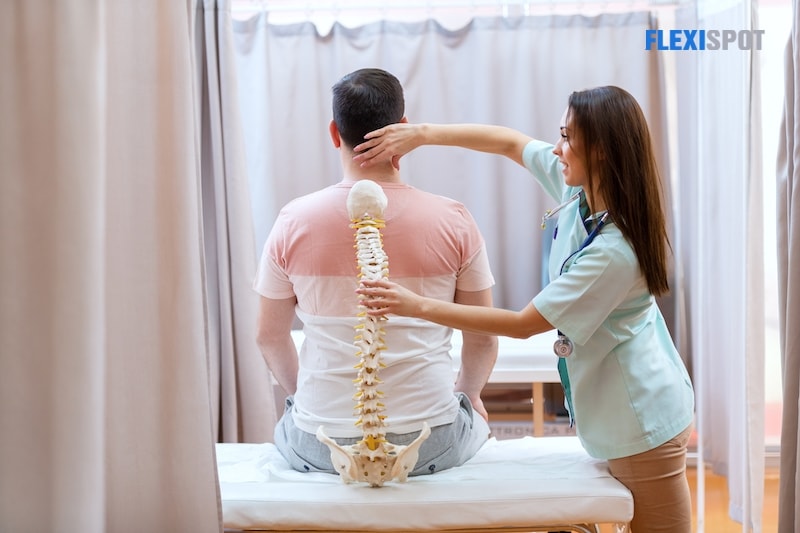Is it possible that individuals might have gotten roused up following a sound slumber or returned early to the house from a hard shift at the office but to be met by a searing discomfort throughout their whole back?
Having spinal discomfort in the morning and night is never a pleasant experience to begin or end the workday. In the event that folks have encountered such annoyance, readers are hardly the only ones.
It is estimated that individuals who devote their lives to working in front of a computer may suffer from lower lumbar discomfort at a certain period throughout their lives. This usually goes away on its own after several days, sans the need for attention or assistance from an expert.
It proves to be a fantastic information for those who suffer from the odd burst of pain.
However, it's not really unusual to suffer from recurrent backache that comes and goes on a regular basis, causing discomfort.
Anyone who has endured the recurring aspect of this terrible pain understands how important it is to get care as soon as the symptoms appear.
Individuals must seek out a therapy strategy that would not merely provide immediate alleviation, yet would also tackle the underlying source, therefore reducing the likelihood of repetition in the long run.
Spinal Discomfort Can Be Explained by a Variety of Things
The following constitute the leading prevalent explanations of lumbar discomfort:
Tension in the tissues of the lower spine is frequently induced by injury to these regions, which might include being overworked or ripped during the process.
Weight training, bending, and rotating, as well as athletic traumas, are by far the major causes of such a condition.
Lumbar disc syndrome is characterized by the degeneration or weakening of the segments of the vertebrae, that results in discomfort, stiffness, or paralysis within the spinal column.
Heredity, fat, or a small accident that results in a slipped disc can all contribute to the development of this degeneration.
The narrowing is a condition wherein the free areas in the spinal column tend to close in on themselves.
This results in tension being exerted on the muscles, which can induce discomfort within limbs and render walking challenging.
Such diseases have the potential to be devastating if not treated properly.
If individuals haven't visited a doctor about severe backaches already, don't be concerned: such disorders are not always life-threatening and therefore do not necessitate immediate examination and therapy.
Bodily Manifestations That Point To Of A Big Warning Check Situation
Individuals could be inclined to disregard such discomfort as anything many could handle alone or just shrug off, but there are instances wherein individuals should seek medical attention immediately and consult with a doctor.
Look for the following warning indicators, which may indicate a medical emergency:
Lumbar discomfort accompanied by illness plus shivering might be a sign of inflammation in the spinal canal.
A vertebral malignancy may cause nighttime discomfort and fat reduction, which might be a symptom of a malignancy.
Lumbar discomfort is a frequent sign of a lumbar column problem, as is a shaky stride along with chronic discomfort.
Most appear abruptly following a violent incident, such as an automobile collision must be evaluated by a healthcare practitioner immediately for the possibility of breakage, vertebral nerve damage, and perhaps similar severe disorders, such as disc herniation.
Losing sensations to your lower region can also be a warning sign. This could be the body’s way of alerting you about spinal problems such as scoliosis.
Therefore, may lumbar as well as shoulder discomfort be a symptom of a more severe situation?

Although this is quite prevalent and typically harmless, there are several indications and complaints that might suggest a potentially severe health issue that necessitates additional assessment and therapy. These include:
A sickness that does not go away.
Unintentional bodyweight reduction occurs.
Bleeding found the feces or pee is a medical emergency.
Loss of sensation or rigidity that worsens with time.
Failure to pee or perform a digestive function for an extended period.
Failure of management over one's bowels and urine.
Ache in the middle of the evening.
Disruption of reproductive performance.
Issues with the equilibrium.
Changes do not affect the discomfort and may even make it severe.
Usage intravenous drugs during the last several weeks.
Notwithstanding comparative relaxation, the discomfort is becoming increasingly severe.
An injury that has recently occurred.
Certain signs might appear quickly, whereas some develop steadily over a period of time.
There exist a variety of circumstances that might cause such telltale signs to appear.
Identifying the Signs and Symbols
The most essential factor to remember is to pay attention to any indicators and what they're experiencing, regardless of how long that roster of probable diseases seems.
Furthermore, keep in mind that every indication individual is having other than spinal problems should be taken into consideration.
In conjunction with severe spinal discomfort, give close notice to any other complaints patients may be experiencing, particularly changes in a urinary capacity as well as limb mobility. It's indeed possible that individuals are at higher danger for significant spinal problems if folks exhibit all of these warning sign indications when the problem lingers and therefore never seem to be connected to mobility, or whether individuals have had a background of illness, previous intravenous medication abuse, or an arterial illness.
Care and management
Fortunately, we will not be the only ones when dealing with any of these indications and feelings. That's when a physician's knowledge and experience help a lot.
For patients who are experiencing warning sign indications, immediate or spontaneous scanning, tests, and assessment could be necessary, which would be usually accomplished by a visit to the nearest hospital unit.
To get the quickest assessment possible, the greatest advice would be to visit the physician as immediately as they suspect anything is amiss because prompt and comprehensive therapy could assist people to prevent potentially severe complaints and diseases later on.





